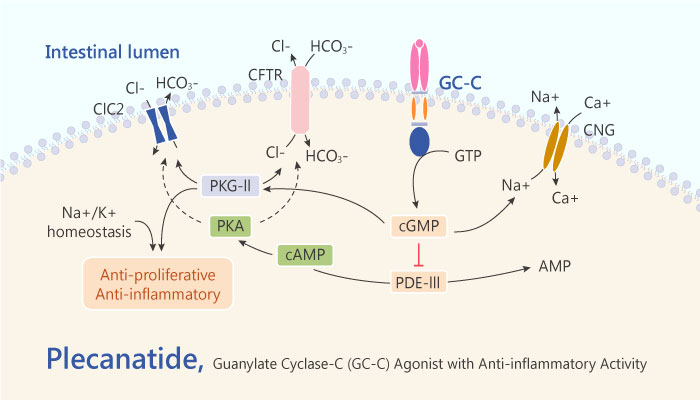Chronic inflammatory bowel diseases are multifactorial gastrointestinal diseases, may due to poor immune system. Guanylate cyclase-C (GC-C) signaling proves to inhibit gastrointestinal inflammation and prevent colorectal tumorigenesis. Thus, we need find out an effective GC-C receptor agonist to treat such diseases. Plecanatide, a potent guanylate cyclase-C agonist turns out to have significant anti-inflammatory effect.

Firstly, researchers underwent a couple of steps to identify the potency of the compound. They used Plecanatide, an equivalent compound to Plecanatide acetate.
In cellular assays, they took experiments in T84 cells. Plecanatide bound and activated GC-C receptor, stimulating cGMP synthesis, with an EC50 of 190 nM.
Then, they identified the activity in vivo assays. The reporters established a colitis model in female BALB/c mice (2-4 months old) with trinitrobenzene sulfonic (TNBS). The doses of Plecanatide were 0, 0.5 and 2.5 mg/kg, respectively. Plecanatide ameliorated spontaneous and chemically induced colitis after treatment for 7 days in BALB/c mice.
Meanwhile, They also choosed 10-12 week-old BDF-1 mice with colitis induced by TNBS in the assay. Plecanatide was at concentrations of 0.005-5 mg/kg, and administered once daily for 7 days. It exhibited significant anti-inflammatory activity in dextran sulfate sodium (DSS) and TNBS-induced colitis mice.
Moreover, Sixteen-week-old TCRα<sup>-/-</sup> mice are also dosed with Plecanatide. Plecanatide (0.5 or 2.5 mg/kg) obviously reduced spontaneous and chemically induced colitis after treatment for 14 days in animals.
In summary, Plecanatide is a potent guanylate cyclase-C agonist, and is effective against inflammatory response. Researcher need to go on further study to find out more potential about this agonist.